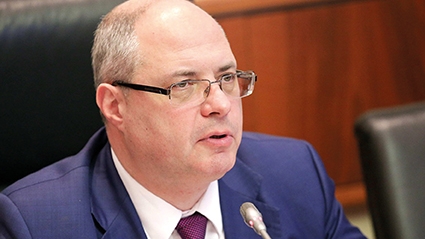Russian MP Gavrilov: Georgia Can Learn Protection of Human Rights from Moscow
Sergey Gavrilov, Head of the State Duma Committee on the Development of Civil Society, Issues of Public and Religious Associations, whose appearance on June 20 in the seat of the Georgian Parliament Speaker sparked large-scale protests in Tbilisi, says Georgia could learn human rights protection from the experience of Russia.
The MP said sharing Russian experience in human rights protection would help Georgia for the stabilization of recent developments. The information was released by the Russian media.
At the Duma Committee sitting, which was also attended by the Russian Ombudsman Tatjana Moskalkova, Gavrilov thanked the Public Defender for "the prompt reaction related to the incident in Georgia, when Russian MPs were attacked.”
“It is a pity that Georgia is not part of the Eurasian Alliance (ombudsmen) because it would learn from the experience of Russian human rights activities which would help to stabilize Georgia’s internal political situation and restore its image, build a democratic model and develop this country,” he said.
Anti-Russian demonstrations in Georgia were launched after a session of the General Assembly of the International Assembly on Orthodoxy (IAO) on June 20. Gavrilo, IAO president, took the speaker’s seat in the Georgian parliament.
Outraged by this action, the Georgian opposition disrupted the event and the protests ended in an attempt to break into the parliament’s building. The Russian delegation had to leave the country and the assembly was ended, after which Gavrilov claimed Russian MPs were attacked.
Officially, Tbilisi says Russian lawmakers were not attacked. The authorities also assure that the safety of all tourists and guests, including Russians, are properly ensured in Georgia.
Following the anti-Russian protests, Russian President Vladimir Putin banned flights to Georgia and tightened Georgian wine exports to Russia.
Freedom House report Freedom in the World 2019 measuring democracy in countries, shows that Russia is listed among Not Free countries, with 20 points out of maximum 100.
The report reads that “power in Russia’s authoritarian political system” is concentrated in the hands of President Vladimir Putin.
“With loyalist security forces, a subservient judiciary, a controlled media environment, and a legislature consisting of a ruling party and pliable opposition factions, the Kremlin is able to manipulate elections and suppress genuine dissent. Rampant corruption facilitates shifting links among bureaucrats and organized crime groups,” the Freedom House says.
The report also stresses that although the Russian constitution provides for freedom of speech, “vague laws on extremism grant the authorities great discretion to crack down on any speech, organization, or activity that lacks official support.”
Freedom House reports that the Russian government continued its “relentless campaign” against nongovernmental organizations in 2018 and a total of 15 foreign NGOs have been deemed “undesirable organizations” on the grounds that they threaten national security.
As for Georgia, it has 63 scores and is in the list of Partly Free countries. The report reads Georgia holds “regular and competitive” elections, and its democratic trajectory “showed signs of improvement.”
Regarding freedom of expression and human rights, the report reads freedom of assembly is generally respected in the country, adding the civil society sector has grown significantly in recent years. In this category, Georgia has 3 out of a maximum 4 points, while Russia has 0.
By Thea Morrison
Photo source: duma.gov.ru












